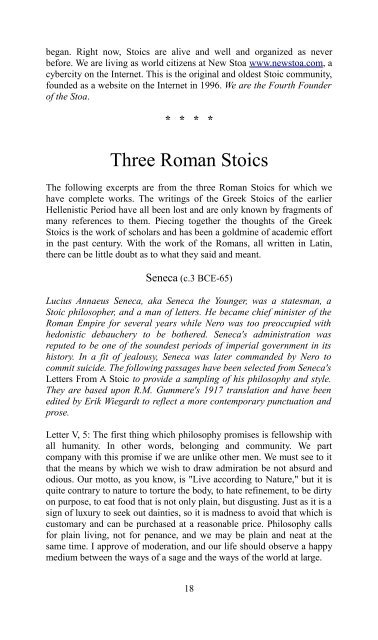The Stoic HANDBOOK - College of Stoic Philosophers
The Stoic HANDBOOK - College of Stoic Philosophers
The Stoic HANDBOOK - College of Stoic Philosophers
You also want an ePaper? Increase the reach of your titles
YUMPU automatically turns print PDFs into web optimized ePapers that Google loves.
egan. Right now, <strong>Stoic</strong>s are alive and well and organized as never<br />
before. We are living as world citizens at New Stoa www.newstoa.com, a<br />
cybercity on the Internet. This is the original and oldest <strong>Stoic</strong> community,<br />
founded as a website on the Internet in 1996. We are the Fourth Founder<br />
<strong>of</strong> the Stoa.<br />
* * * *<br />
Three Roman <strong>Stoic</strong>s<br />
<strong>The</strong> following excerpts are from the three Roman <strong>Stoic</strong>s for which we<br />
have complete works. <strong>The</strong> writings <strong>of</strong> the Greek <strong>Stoic</strong>s <strong>of</strong> the earlier<br />
Hellenistic Period have all been lost and are only known by fragments <strong>of</strong><br />
many references to them. Piecing together the thoughts <strong>of</strong> the Greek<br />
<strong>Stoic</strong>s is the work <strong>of</strong> scholars and has been a goldmine <strong>of</strong> academic effort<br />
in the past century. With the work <strong>of</strong> the Romans, all written in Latin,<br />
there can be little doubt as to what they said and meant.<br />
Seneca (c.3 BCE-65)<br />
Lucius Annaeus Seneca, aka Seneca the Younger, was a statesman, a<br />
<strong>Stoic</strong> philosopher, and a man <strong>of</strong> letters. He became chief minister <strong>of</strong> the<br />
Roman Empire for several years while Nero was too preoccupied with<br />
hedonistic debauchery to be bothered. Seneca's administration was<br />
reputed to be one <strong>of</strong> the soundest periods <strong>of</strong> imperial government in its<br />
history. In a fit <strong>of</strong> jealousy, Seneca was later commanded by Nero to<br />
commit suicide. <strong>The</strong> following passages have been selected from Seneca's<br />
Letters From A <strong>Stoic</strong> to provide a sampling <strong>of</strong> his philosophy and style.<br />
<strong>The</strong>y are based upon R.M. Gummere's 1917 translation and have been<br />
edited by Erik Wiegardt to reflect a more contemporary punctuation and<br />
prose.<br />
Letter V, 5: <strong>The</strong> first thing which philosophy promises is fellowship with<br />
all humanity. In other words, belonging and community. We part<br />
company with this promise if we are unlike other men. We must see to it<br />
that the means by which we wish to draw admiration be not absurd and<br />
odious. Our motto, as you know, is "Live according to Nature," but it is<br />
quite contrary to nature to torture the body, to hate refinement, to be dirty<br />
on purpose, to eat food that is not only plain, but disgusting. Just as it is a<br />
sign <strong>of</strong> luxury to seek out dainties, so it is madness to avoid that which is<br />
customary and can be purchased at a reasonable price. Philosophy calls<br />
for plain living, not for penance, and we may be plain and neat at the<br />
same time. I approve <strong>of</strong> moderation, and our life should observe a happy<br />
medium between the ways <strong>of</strong> a sage and the ways <strong>of</strong> the world at large.<br />
18

















